
The Glass Castle by Jeannette Walls (Books & Banter book club)
This was my 3rd time reading this book and it was just as good as it was the first time!
Jeannette Walls had an almost unbelievable childhood. Her mother is an artist who can't be bothered to cook or clean or do much of anything for her children, while her father is an alcoholic who can't hold down a job so they are always doing the "skedaddle" to get away from the FBI, or rather bill collectors. They live in small towns throughout California and Arizona, but eventually make their way back to Welch, West Virginia where her father is from. It's there that you see why her father is an alcoholic - his family is horrific and unfortunately they live in their grandparent's basement for awhile. Her father drinks away any money that comes in and the kids are all chronically hungry and filthy. Once Jeannette is in high school she realizes her father is never going to change and her best hope is to get away from Welch and her parents as fast as she can. She and all her siblings end up in New York City, where eventually her parents join them by being homeless and eventually squatting illegally in an abandoned building. No matter how crazy your family is, it can't even begin to compare to the Walls family.
This is the 3rd time I've read this book and every time I read it I'm amazed that all 4 children turned out to be normal, productive adults. This is an AMAZING memoir that really opened the door for other survivors of dysfunctional families to share their own dysfunctional family stories.
"We laughed about all the kids who believed in the Santa myth and got nothing for Christmas but a bunch of cheap plastic toys. 'Years from now, when all the junk they got is broken and long forgotten,' Dad said, 'you'll still have your stars.'" (p. 41)
"Although we were the poorest family on Little Hobart Street, Mom and Dad never applied for welfare or food stamps, and they always refused charity. When teachers gave us bags of clothes from church drives, Mom made us take them back. 'We can take care of our own,' Mom and Dad liked to say. 'We don't accept handouts from anyone.'" (p. 159)
[After moving to New York City and being homeless] "'You can't live like this,' I said. 'Why not? Mom said. 'Being homeless is an adventure.'" (p. 255)
"'We don't need anything,' Mom said. 'We're fine.' She put down her teacup. 'It's you I'm worried about.' 'You'reworried about me?' 'Yes. Very worried.' 'Mom,' I said. 'I'm doing very well. I'm very, very comfortable.' 'That's what I'm worried about,' Mom said. 'Look at the way you live. You've sold out. Next thing I know, you'll become a Republican.' She shook her head. 'Where are the values I raised you with?'" (p. 269)
"'You mean you own land worth a million dollars?' I was thunderstruck. All those years in Welch with no food, no coal, no plumbing, and Mom had been sitting on land worth a million dollars? Had all those years, as well as Mom and Dad's time on the street - not to mention their current life in an abandoned tenement - been a caprice inflicted on us by Mom? Could she have solved our financial problems by selling this land she never even saw? But she avoided my questions, and it became clear that to Mom, holding on to land was not so much an investment strategy as it was an article of faith, a revealed truth as deeply felt and incontestable to her as Catholicism. And for the life of me, I could not get her to tell me how much the land was worth...'Mom, I can't ask Eric for a million dollars.' 'Jeannette, I haven't asked you for a lot of favors, but I'm asking you for one now. I wouldn't if it wasn't important. But this is important.'...'Jeannette,' Mom said when she had accepted the fact that she would not get her way,'I'm deeply disappointed in you.'" (p. 273)
This is the 3rd time I've read this book and every time I read it I'm amazed that all 4 children turned out to be normal, productive adults. This is an AMAZING memoir that really opened the door for other survivors of dysfunctional families to share their own dysfunctional family stories.
"We laughed about all the kids who believed in the Santa myth and got nothing for Christmas but a bunch of cheap plastic toys. 'Years from now, when all the junk they got is broken and long forgotten,' Dad said, 'you'll still have your stars.'" (p. 41)
"Although we were the poorest family on Little Hobart Street, Mom and Dad never applied for welfare or food stamps, and they always refused charity. When teachers gave us bags of clothes from church drives, Mom made us take them back. 'We can take care of our own,' Mom and Dad liked to say. 'We don't accept handouts from anyone.'" (p. 159)
[After moving to New York City and being homeless] "'You can't live like this,' I said. 'Why not? Mom said. 'Being homeless is an adventure.'" (p. 255)
"'We don't need anything,' Mom said. 'We're fine.' She put down her teacup. 'It's you I'm worried about.' 'You'reworried about me?' 'Yes. Very worried.' 'Mom,' I said. 'I'm doing very well. I'm very, very comfortable.' 'That's what I'm worried about,' Mom said. 'Look at the way you live. You've sold out. Next thing I know, you'll become a Republican.' She shook her head. 'Where are the values I raised you with?'" (p. 269)
"'You mean you own land worth a million dollars?' I was thunderstruck. All those years in Welch with no food, no coal, no plumbing, and Mom had been sitting on land worth a million dollars? Had all those years, as well as Mom and Dad's time on the street - not to mention their current life in an abandoned tenement - been a caprice inflicted on us by Mom? Could she have solved our financial problems by selling this land she never even saw? But she avoided my questions, and it became clear that to Mom, holding on to land was not so much an investment strategy as it was an article of faith, a revealed truth as deeply felt and incontestable to her as Catholicism. And for the life of me, I could not get her to tell me how much the land was worth...'Mom, I can't ask Eric for a million dollars.' 'Jeannette, I haven't asked you for a lot of favors, but I'm asking you for one now. I wouldn't if it wasn't important. But this is important.'...'Jeannette,' Mom said when she had accepted the fact that she would not get her way,'I'm deeply disappointed in you.'" (p. 273)
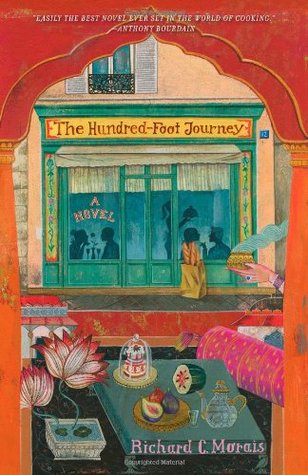
The Hundred Foot Journey by Richard Morais (Evening Edition book club)
Hassan Haji's favorite memory was helping his grandmother cook in their restaurant kitchen. His grandparents started small and expanded over time to create an Indian food empire, but after their deaths he and his family moved away to London and eventually they ended up in the French Alps. There Haji's father opened an Indian restaurant that drew the immediate ire of the nearby restaurateur Gertrude Mallory. It was Mallory who finally noticed Hassan's incredible cooking talent and took him under her wing. Hassan grew to be an amazing chef and his restaurant would eventually earn 3 Michelin stars.
This is one of my book club's books and honestly I wouldn't have read it if not for book club. It wasn't terrible, but it definitely wasn't spectacular either. The beginning of the book just doesn't seem to fit with the rest of the book, but it does get better once Hassan is cooking and that's the focus. I just didn't connect with Hassan or the book and if it wasn't for book club I wouldn't have finished it. I wouldn't recommend this one.
This is one of my book club's books and honestly I wouldn't have read it if not for book club. It wasn't terrible, but it definitely wasn't spectacular either. The beginning of the book just doesn't seem to fit with the rest of the book, but it does get better once Hassan is cooking and that's the focus. I just didn't connect with Hassan or the book and if it wasn't for book club I wouldn't have finished it. I wouldn't recommend this one.
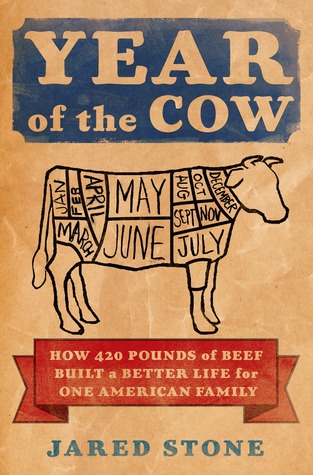
Year of the Cow by Jared Stone
Jared Stone realizes that he hardly knows anything about where his food comes from - so he decides to buy a whole cow. Stone always liked to cook, but having an entire steer in his freezer really motivates him to try new things with new cuts of meat and even delve into bone marrow and organ meats. While not everything he cooks turns out fantastic, a lot of it does. He soon realizes that the quality of the meat is much more important than the skills of the cook (although he also quickly learns that grass-fed beef requires MUCH less cooking time than grain-fed). By cooking more he is eating more whole foods, feels better, is motivated to exercise more, and eventually buying a whole cow transforms Stone's whole family for the better. Stone's experience shows that often one seemingly small change like buying local, pastured meat can lead to more and more changes and one day you look back and don't even recognize the "old" you. This is one of those great food memoirs that really motivates you to do more and cook more yourself - and he also ends each chapter with a recipe. I would HIGHLY recommend this one!
Some quotes I liked:
"Frequently, Summer and I find ourselves reverting to previous iterations of a technology or technique that, for one reason or another, fell out of favor. I start jokingly referring to this state as One Step Back. Then, not so jokingly.
One Step Back, cows ate grass.
One Step Back, more people knew how to cook.
One Step Back, obesity was rarer.
...Every task I perform, every methodology I employ - again and again: How was it done previously? And was it done better One Step Back?" (p. 198)
"In my opinion, if we take an animal's life for a meal, we owe it to that animal to make the most of the sacrifice. In this case, we're eating a heart. It's one more meal from the carcass, one more dinner where we don't have to look elsewhere - to another cut or another critter - for sustenance. One more moment of recognition that this was once an animal, and we must not - should not, cannot - take it for granted. It wasn't a great meal. But it was a good meal. And I'm glad we did it." (p. 228-9)
"Cooking with this steer has taught me, if nothing else, not to accept the default option. In cooking, in eating, in running, in working, in playing - other options exist and have their own benefits and shortcomings. And in some cases, I've found them preferable to their more recently developed defaults." (p. 301)
Some quotes I liked:
"Frequently, Summer and I find ourselves reverting to previous iterations of a technology or technique that, for one reason or another, fell out of favor. I start jokingly referring to this state as One Step Back. Then, not so jokingly.
One Step Back, cows ate grass.
One Step Back, more people knew how to cook.
One Step Back, obesity was rarer.
...Every task I perform, every methodology I employ - again and again: How was it done previously? And was it done better One Step Back?" (p. 198)
"In my opinion, if we take an animal's life for a meal, we owe it to that animal to make the most of the sacrifice. In this case, we're eating a heart. It's one more meal from the carcass, one more dinner where we don't have to look elsewhere - to another cut or another critter - for sustenance. One more moment of recognition that this was once an animal, and we must not - should not, cannot - take it for granted. It wasn't a great meal. But it was a good meal. And I'm glad we did it." (p. 228-9)
"Cooking with this steer has taught me, if nothing else, not to accept the default option. In cooking, in eating, in running, in working, in playing - other options exist and have their own benefits and shortcomings. And in some cases, I've found them preferable to their more recently developed defaults." (p. 301)
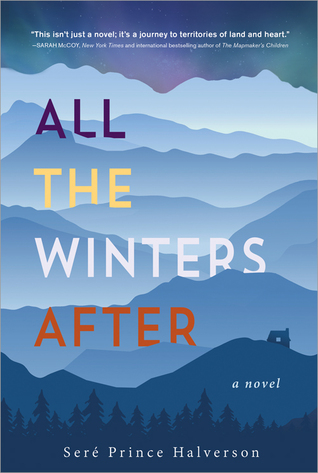
All the Winters After by Sere Prince Halverson
Kachemak Winkel is named for the Alaskan Bay near his family's homestead. But, Kache never feels connected to the land like his father and older brother do and after his parents and brother are killed in a plane crash he leaves Alaska. Twenty years pass before Kache can bear to go back. His aunt is supposed to be taking care of their family cabin, but when he goes back his Aunt Snag tells him that she couldn't bear to go back either. He assumes it will be a pile of rotten logs, but when he gets there he finds a Russian woman has been living there for the past 10 years hiding from an abusive past. Nadia never intended to stay for 10 years, but after awhile she felt like she knew the Winkel family. Both Nadia and Kache have been running from their painful pasts and now it's time for them to come to terms with the losses they've suffered and start living again.
This is a beautifully written novel that explores family, forgiveness, and grief. Halverson's descriptions of Alaska make you want to pick up and move there. The way she lays out the story is just so well done and I think this one is even better than The Underside of Joy which I loved. I can't wait to see what she does next - I'd love to have a sequel to this one to find out what happens next with Kache and Nadia.
This is a beautifully written novel that explores family, forgiveness, and grief. Halverson's descriptions of Alaska make you want to pick up and move there. The way she lays out the story is just so well done and I think this one is even better than The Underside of Joy which I loved. I can't wait to see what she does next - I'd love to have a sequel to this one to find out what happens next with Kache and Nadia.

Every Last Tie: the Story of the Unabomber and His Family by David Kaczynski
I was excited to read this book because I'd seen David Kaczynski speak a few times on TV about his brother and the difficulty he had turning him in to the FBI. But, the book was a little disappointing. I did really like that he includes lots of family pictures. Similarly to Sue Klebold's book, A Mother's Reckonin, it helps humanize Ted Kaczynski and you can see how his family knew there were problems, but never imagined he would turn into the Unibomber. The book is VERY short - only 4 chapters and each chapter focuses on a specific relationship - how David came around to suspecting his brother might be the Unibomber, a chapter on his mother, one on his father, and then one on his relationship with his wife Linda, who first suspected Ted as the Unibomber. The tone of the book is very light and almost disconnected. I guess I wished for a more thorough and linear book about David and Ted's lives. It's not a bad book, just not what I was expecting. The Afterward is written by James L. Knoll who is a forensic psychologist. That section is so full of psychologist terminology and philosophy that it was a little hard to follow. It was more of a philosophical look at the situation than a more detailed memoir, which was what I was hoping for. It was OK, but not great.
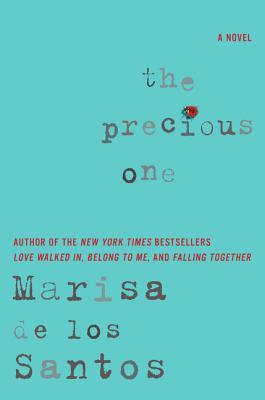
The Precious One by Marisa de los Santos
Taisy and her twin brother Marcus grew up with their domineering and cold father, but their life really changed when their parents split up and their father started a new family with a much younger woman. Their father completely cut them off and never contacted either of them in over 17 years - until he reaches out to Taisy while recovering from a heart attack. Marcus refuses to see him, but Taisy is hopeful that this near-death experience might have changed their father. What Taisy doesn't expect is to really like her step-mother Caro and half-sister Willow. She also didn't expect to reconnect with her first love Ben. All of these relationships are put to the test over one fateful Thanksgiving dinner when Taisy tries one last time to connect with her father.
I always know a book isn't good when it takes me forever to read it. Usually I blow through books I love in a few days or less, but I just couldn't get into this one. The characters aren't bad, but parts of the storyline work out just a little too well and I don't understand why Taisy keeps trying to have a relationship with her father who clearly doesn't love or care about her. I really liked the authors previous books, but I didn't really like this one much. I did want to see what happened, but I thought the ending tied everything up a little too perfectly and unrealistically.
I always know a book isn't good when it takes me forever to read it. Usually I blow through books I love in a few days or less, but I just couldn't get into this one. The characters aren't bad, but parts of the storyline work out just a little too well and I don't understand why Taisy keeps trying to have a relationship with her father who clearly doesn't love or care about her. I really liked the authors previous books, but I didn't really like this one much. I did want to see what happened, but I thought the ending tied everything up a little too perfectly and unrealistically.

The Feelgood Plan by Dalton Wong
The feelgood plan is all about making smaller, healthier choices that add up to feeling better all the time. The book is divided into 3 main sections - Eat, Move, Relax. Each of these sections talks about healthier choices you can make relating to each of those areas and almost all of them are something you can do in 15 minutes or less. I really liked that in the Move section they give you a basic body weight workout, then how you can up that workout, and how to know when you're ready to move on to the next level workout. Nothing seems wild or super hard, so I think this book could help someone just starting to get healthy as much as someone who got off track or wants to step things up in a certain area. At the end there is a 12 week plan you can do that charts out exercise and eating plans for those 12 weeks. Overall, it looks like a solid and very do-able plan to get healthier and feel better without being overwhelming.
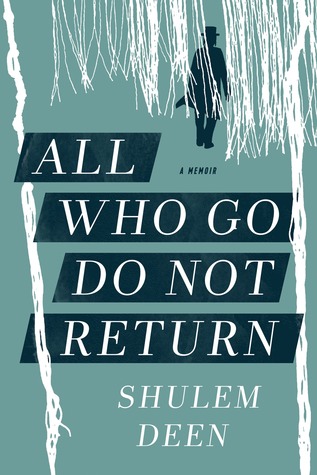
All Who Go Do Not Return by Shulem Deen
Shulem Deen grew up in an ultra-Orthodox Jewish home where every aspect of you life is tightly controlled by lists and lists of rules and regulations. A few different encounters make him curious about the outside world that he was always taught was so dangerous. He starts small by listening to the radio, which leads to going to the public library, then the internet, then forbidden books, and TV. Soon he knows he is a heretic and feels like everyone around him can see his unbelief. Based on nothing but rumors, he is expelled from his community and he and his family move away from the only life they've known. But, only Shulem is willing to explore the outside world - his wife does NOT share his views and soon they divorce and she moves back with their 5 children. From here the books gets REALLY depressing because the Orthodox community works hard to keep him separated from his children and by the end of the book he really has no relationship with them at all. Fortunately he does find a community of ex-Orthodox Jews that have left similar communities who all understand each other in a way no one else can. Also, Deen's immediate family - his mother and siblings all still accept him and maintain a relationship with him even after he leaves the faith. While in some ways this book was REALLY interesting since the Orthodox Jewish world is SO completely different and unique, but it was also sad to watch Deen lose all faith in God and then lose his family as well. I'm curious about whether he is ever able to reconnect with his children once they are older.
Some quotes I liked:
"In later years, I would have words for that which I could not articulate to the rebbe or to Avremel, words from beyond our cloistered world of tischen and Talmud study and groom instruction: Attraction, Chemistry, Compatibility, I would later learn other words - passion, romance, arousal, desire - that I wanted as well, but to want those was an unquestionable sin; those feelings and thoughts and behaviors that passed between sexes outside of our world were anathema to us and our sacred ways." (p. 40)
"I hated that we relied on the government for so much. I hated that we skirted, just barely, the edges of legality. That we made sure never to report earning one cent more than the official poverty level so that we could keep our food stamps and our Section 8 and our WIC checks. I hated that the economics of our village were such that all matters of finance were bound up in deception. 'On the books or off the books?' was the big question for every new job. And still, the money was never enough." (p. 105)
"'Read the books,' Chezky said. 'Maybe they'll change your mind.' I wanted to. In fact, I was burning with curiosity, but to read these books felt treacherous, like stepping onto a tightrope across rocky river rapids with no tightrope-walking skills. This was exactly what the rabbis had warned about. Chakirah, they called it. Rational inquiry. And it led, they warned, to bad things...Chezky shrugged. 'Just remember this: when blind faith is all you have, you end up slashing people's car tires for not inviting the rebbe to a bris.'" (p. 173)
Some quotes I liked:
"In later years, I would have words for that which I could not articulate to the rebbe or to Avremel, words from beyond our cloistered world of tischen and Talmud study and groom instruction: Attraction, Chemistry, Compatibility, I would later learn other words - passion, romance, arousal, desire - that I wanted as well, but to want those was an unquestionable sin; those feelings and thoughts and behaviors that passed between sexes outside of our world were anathema to us and our sacred ways." (p. 40)
"I hated that we relied on the government for so much. I hated that we skirted, just barely, the edges of legality. That we made sure never to report earning one cent more than the official poverty level so that we could keep our food stamps and our Section 8 and our WIC checks. I hated that the economics of our village were such that all matters of finance were bound up in deception. 'On the books or off the books?' was the big question for every new job. And still, the money was never enough." (p. 105)
"'Read the books,' Chezky said. 'Maybe they'll change your mind.' I wanted to. In fact, I was burning with curiosity, but to read these books felt treacherous, like stepping onto a tightrope across rocky river rapids with no tightrope-walking skills. This was exactly what the rabbis had warned about. Chakirah, they called it. Rational inquiry. And it led, they warned, to bad things...Chezky shrugged. 'Just remember this: when blind faith is all you have, you end up slashing people's car tires for not inviting the rebbe to a bris.'" (p. 173)
No comments:
Post a Comment